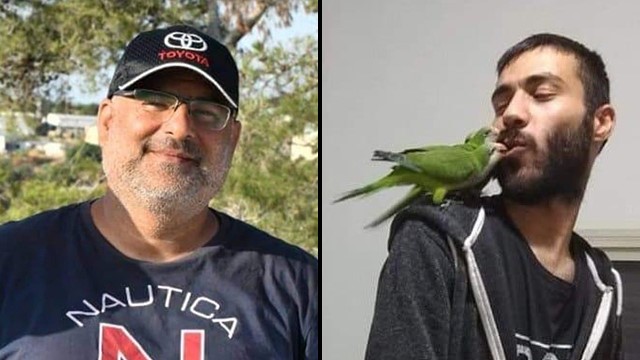Two men, members of the same family, were shot dead on Friday night, December 18, near Baka al-Garbiyeh in northern Israel, less than an hour after a third member of the same family was also mortally shot. According to Al‑Ittihad, Ahmad and Muhammad Sharqiya were shot as they were driving behind the ambulance that was rushing their relative, Amir Abu-Hussein, 25, to hospital after he had been gunned down in a gangland killing. Abu-Hussein was pronounced dead at Hillel Yaffe Hospital in Hadera.

Ahmad and Muhammad Sharqiya were shot dead by assailants as they rushed by car after the ambulance carrying their mortally wounded relative, Amir Abu-Hussein, to hospital, Friday, December 18, 2020. (Photo: Al-Ittihad)
The head of The Higher Arab Monitoring Committee and former Hadash MK Mohammad Barakeh called on the Arab community in Israel to continue its protest against violence and murder in their sector despite Prime Minister Benjamin Netanyahu’s having announced a plan to combat rising crime in the Arab community. “The Arab public will not settle for announcements and meetings; it wants an action plan to fight crime, with an emphasis on the crime organizations,” Barakeh said. A mass demonstration sponsored by The Higher Arab Monitoring Committee will be held tomorrow, Monday, December 21, starting from Kafr Qara (35 km southeast of Haifa) and ending in Jerusalem, near the Knesset.
In an unusual move last month, Netanyahu attended a special session of the Knesset committee to fight violence in Arab society, which broadly addressed the government proposal to combat violence and concluded that the plan would be approved soon, perhaps within two weeks. A month and a half later, the plan has still not been approved, nor is it clear when it will be; moreover, no budget has been allocated for it. Meanwhile, the number of victims of violence in Arab communities continues to rise.
Head of the Joint List, MK Ayman Odeh (Hadash), said, “70% of the solution to the problem of crime lies in the hands of the Israeli authorities, while the Arabs are 30% responsible. We blame the government. We hold Netanyahu and Minister of Public Security Amir Ohana responsible.” Odeh said that the No. 1 concern of the Arab citizens now is how to force the authorities to carry out their duties in combating crime. “The establishment is relating to us in a racist manner and lying to us,” Odeh charged. “We need to take unprecedented measures until we force the authorities to acknowledge the gravity of the situation.”
The Abraham Initiatives NGO said after Friday night’s triple homicide that 93 Arab citizens of Israel have been murdered this year, compared to 89 in 2019 and 71 in 2018. Of this year’s fatalities, 16 were women, and 73 were killed by firearms, the group said.
Abraham Initiatives conducted a survey last April in which it interviewed 718 Arab citizens of Israel. A separate survey was conducted among 500 Jewish citizens to compare the results. More than half of Arab citizens said they felt insecure in their area of residence, compared with 35.8% in 2018, while also compared with 12.8% of Jewish citizens who said they felt insecure in the areas where they live. The survey found that 6.2% of the Arab respondents said they feared for their personal safety within their own homes. Almost two-thirds (64.5%) of Arabs respondents who experienced violence or threats of violence reported that they knew the assailant or the person threatening them.
The recent survey by Abraham Initiatives revealed that Arab citizens are overall more worried by the threat of crime and violence than of racist legislation, societal inequality and the peace process. Almost three-quarters (73.1%) of Arab citizens are concerned that a family member will be the victim of violent crime, compared with 19.3% of Jewish citizens. There is a similar gap regarding property crimes, the report said. While Arab citizens reported a rise in concern about theft and vandalism, the Abraham Initiatives monitored a drop in the number of Jewish citizens worried about such crimes.


